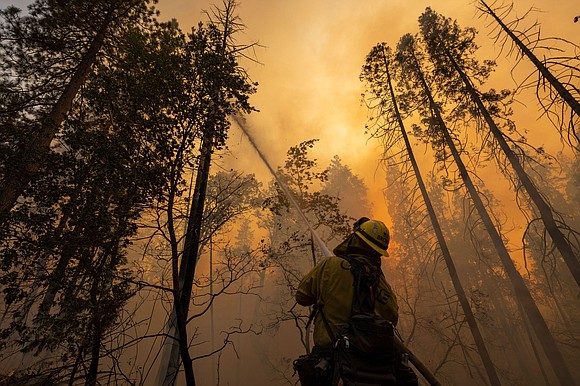California's rapidly-growing Oak Fire engulfs homes near Yosemite National Park as it burns more than 16,000 acres
CNN/Stylemagazine.com Newswire | 7/25/2022, 10:41 a.m.

Originally Published: 25 JUL 22 04:21 ET
Updated: 25 JUL 22 10:45 ET
By Elizabeth Wolfe, CNN
(CNN) -- As thousands of residents were forced to flee a booming wildfire outside California's Yosemite National Park over the weekend, some learned their homes had completely collapsed into ash and debris.
The Oak Fire has exploded in size to more than 16,700 acres since it began Friday in the foothills of the Sierra Nevada, destroying at least 10 structures and damaging five others, state fire officials said. More than 3,200 structures are threatened by the blaze, which was 10 percent contained Monday morning, though authorities said they are making headway. The cause of the fire remains under investigation.
Jane and Wes Smith lost their home of 37 years as the fire ripped through Mariposa County this weekend, their son Nick Smith said, telling CNN his parents were left with "just the clothes on their back and the shoes on their feet."
"It's pretty sad to see the house that I grew up in and was raised in gone," he said. "It hits hard."
His mother only had enough time to load up their horses before escaping the area, Smith said, while his father was busy working on the fire as a Mariposa County sheriff's deputy. Now, the couple is staying with friends and family as they recover from the loss.
Smith started a GoFundMe to support his parents' recovery, writing on the page, "37 years of memories, generations of family treasures, and countless more sentimental things. Although these are materials, it is devastating to lose everything literally in the blink of an eye without notice."
Smith's family is among the more than 3,000 people forced to evacuate their homes due to the Oak Fire, according to a release from Gov. Gavin Newsom's office Saturday. An evacuation center has been established at Mariposa Elementary School, as well as a small animal shelter. The county fairgrounds and Coursegold Rodeo Grounds are serving as a shelter for large animals, according to the sheriff's office.
The fire has also forced the closure of portions of Highway 140 and several adjacent roads, according to Cal Fire.
Newsom declared a state of emergency for Mariposa County Saturday, citing the thousands of displaced residents, destroyed homes and threatened critical infrastructure.
"Fire activity was not as extreme as it has been in previous days. Firefighters made good headway today," Cal Fire wrote in a Sunday night update, noting fire personnel were able to hold the fire off and protect the community of Mariposa Pines.
In all, more than 2,500 personnel are battling the flames. The teams are utilizing more than a dozen helicopters, 281 fire engines and 46 water tenders, which are used to transport large amounts of water, according to Cal Fire.
Parts of the Sierra National Forest, which flanks and partially overlaps with Mariposa County, are closed to the public due to the fire, the Forest Service announced Sunday.
"The Fire's behavior consists of flanking, backing, and creeping through National Forest Systems lands, roads, and recreational areas," the agency posted on its website. "This closure will support public safety by keeping public members out of hazardous burn areas and will allow firefighting resources to combat the Fire without public interference."
The Oak Fire is the largest of California's actively burning fires, which have been fueled by extended drought conditions in much of the state, leaving behind brittle vegetation and underbrush which is quick to burn.
Conditions are further exacerbated by human-caused climate change: As a result, wildfires are becoming more frequent and severe. Blazes are burning longer and hotter in places they've always occurred, according to a report released earlier this year from the UN Environment Programme, and also igniting in unexpected places.
Cal Fire acknowledges the state's longer wildfire seasons, which experts say are beginning to stretch throughout the year, are the direct result of climate change.
Fire officials in Southern California braced for a difficult summer this year, anticipating the hotter, drier summer and the increased frequency of wildfires, even as firefighting crews experience worker shortages.




